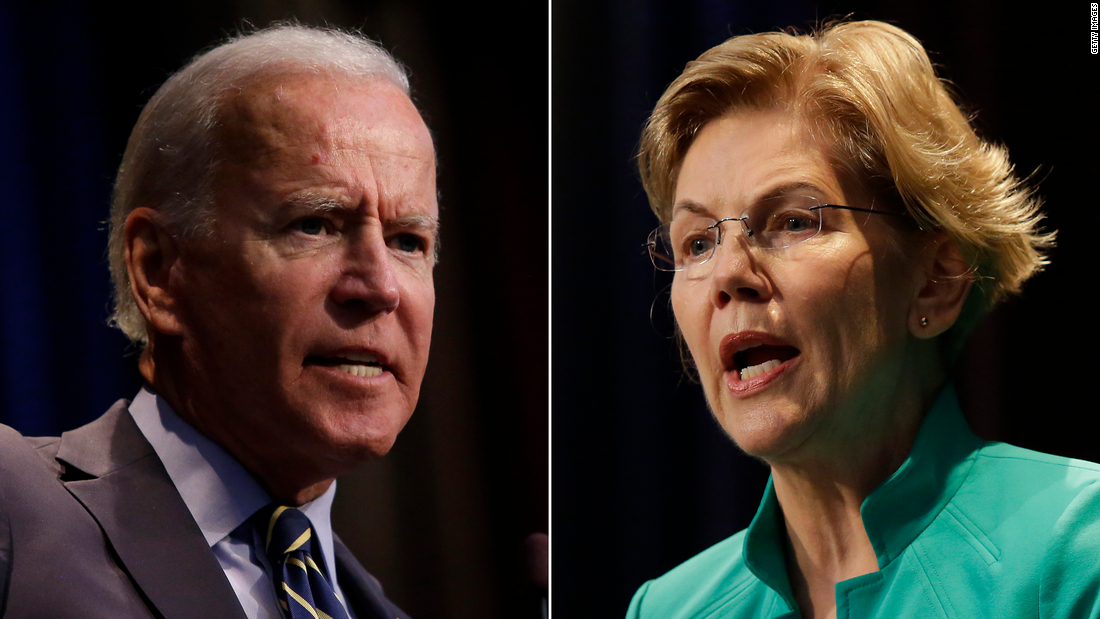[ad_1]
Warren’s improved standing overall in the Iowa poll comes on the heels of a stronger showing in recent national polls and is bolstered by an increasing positive favorability rating (75% have a favorable view, the best in the field, and she is one of only four candidates who have improved their net favorability since the June CNN/DMR poll), as well as a growing percentage of likely caucusgoers who say she is either their first choice, second choice or someone they are actively considering. All told, 71% are at least considering Warren’s candidacy, ahead of the next best candidate on that score by 11 points (Biden at 60%). Her supporters are also more enthusiastic than those behind Biden (32% of her backers are extremely enthusiastic vs. 22% for the former vice president).
The Massachusetts senator appears to be gaining ground primarily at the expense of Sanders. She holds the support of 32% of those who say they caucused for Sanders in 2016 (Sanders himself stands at 25% among that group), stands at 48% among those who consider themselves “very liberal,” and for the first time in CNN/DMR polling on the race, has edged ahead of Sanders among those under age 35 (27% back Warren, 22% Sanders).
Biden’s core backers remain behind him in largely the same way they were in the previous poll. Among seniors, he is the first choice of 35%, about the same as earlier this year. And he remains above 30% support with moderate and conservative likely caucusgoers.
And Warren’s supporters are a bit less apt to be locked in than are those backing Biden (12% of Warren supporters say their mind is made up vs. 26% of Biden’s supporters). Overall, though, just 20% of likely caucusgoers say their mind is made up now, suggesting there is plenty of room for these preferences to shift before February.
Shifts in favorability
For many in the field, a summer spent campaigning in Iowa has done little to improve their chances there. Aside from Warren, no candidate has made meaningful gains in overall support compared with their backing among likely caucus attendees in June, and 10 candidates saw their unfavorable ratings rise by double-digits without an equivalent rise on the positive side of things, including a whopping 30-point increase in negative views of author Marianne Williamson, a 23-point jump for former Secretary of Housing and Urban Development Julián Castro and increases in the teens for former Maryland Rep. John Delaney, Montana Gov. Steve Bullock and Ohio Rep. Tim Ryan.
Sanders and Biden each saw an increase in unfavorable views alongside a drop in favorable ratings (Sanders shifted from 70% favorable and 25% unfavorable to a 58% favorable to 36% unfavorable rating; Biden’s favorable numbers dipped 6 points to 66% while his unfavorable rating rose 5 to 29%).
Yang also saw his unfavorable numbers grow, but the rise was matched by the increase in his favorability rating.
Beyond Warren’s gains, Buttigieg boosted his favorable rating 8 points to 69% without an appreciable rise in unfavorable views, Klobuchar saw favorable views gain 6 points to top 50% for the first time, while her unfavorable numbers rose 4 points, and Booker’s favorability climbed 5 points to 60% as the unfavorable side gained just 3 points.
Prioritizing electability
Though views on the candidates have shifted, those likely to attend Iowa’s Democratic caucuses remain more apt to prioritize nominating a candidate with a strong chance of beating Trump (63%) over one who shares their positions on major issues (31%). And most think that after Trump, American government could return to the way it was before his election (59%).
The poll sought to gain insight into what it is likely caucusgoers think an electable candidate would be. Nearly three-quarters said a candidate who can excite new voters (74%) is closer to their vision of electability than one who would excite the base (16%). And most preferred a candidate who would represent a new generation of leadership (57%) over one with a long history in government (28%), as well as one who would take the high road against Trump (54%) vs. getting in the mud as needed to take on the President (35%).
Roughly two-thirds felt the more electable candidate is one who seeks common ground with Republicans (63%) rather than moving the country to the left (28%). But in assessing six positions that have become signatures of the more liberal candidates in the Democratic field, the poll finds wide variation in likely caucusgoers’ level of comfort with them.
Support for policy positions
Clear majorities say that they are personally comfortable with policies that would raise taxes on the wealthy (74%) and restore the ban on assault-style weapons (69%) and they feel candidates ought to run on those positions. Fewer felt the same about the Green New Deal (48%), “Medicare for All” (41%), free tuition for public colleges (36%) and moving the country in a socialist direction (20%).
Views on Medicare for All in particular are starkly divided between those backing Warren or Sanders — the strongest proponents of such a plan among the Democratic candidates — and those who favor other candidates. Among supporters of Warren or Sanders, 63% say they’re comfortable with Medicare for All and want candidates to run on it, while among those backing other candidates, just 29% feel the same way.
Perceptions on these policy positions are one sharp divider between supporters of the two top candidates. Among Warren’s supporters, 64% say that none of the six tested positions are bad policy. Among Biden’s backers, though, just 29% feel the same way.
The CNN/Des Moines Register/Mediacom poll was conducted by Selzer & Co. of Des Moines, Iowa, September 14 through 18 among a random sample of 602 likely Democratic caucusgoers reached on landlines or cell phones by a live interviewer. Results for the full sample of likely caucusgoers have a margin of sampling error of plus or minus 4.0 percentage points.
[ad_2]
Source link

